Oscar Romero is a Martyr: What’s it to you?
 BY CHRIS KERR | January 15, 2015
BY CHRIS KERR | January 15, 2015
Last week the Vatican announced that Archbishop Oscar Romero was officially declared a “martyr of the Church.” My initial reaction was shock that this was something that was even being debated. For me, Romero’s prophetic witness to the Gospels is the epitome of Christian martyrdom. Grounded in a deep love of Christ he saw the suffering of his Salvadoran brothers and sisters and stood with them to his death. This past summer the Ignatian Solidarity Network organized a delegation of forty-five individuals who traveled to El Salvador to explore the history of the Jesuit martyrs and their companions. Of course, you can’t understand the Jesuit martyrs without understanding the legacy of Romero. I am consistently in awe of how Romero’s story continues to permeate the discourse of faith and life in Central America and beyond, even as we approach the 35th anniversary of his death this March.
I thought it would be interesting to hear others’ reactions from across the Ignatian network on this news. Below are reflections from people both lay and Jesuit who have in some way been impacted by Romero. I invited them to reflect on what the announcement of Romero being identified as a “martyr of the Church” means to them.

Maura Toomb with Kaija Dewitt and Sr. Peggy O’Neill in El Salvador during ISN’s 25th anniversary delegation in July 2014.
Maura Toomb is the director of campus ministry at Saint Peter’s College Preparatory in Jersey City, New Jersey and a graduate of Loyola University Maryland. Maura participated in ISN’s 25th anniversary delegation to El Salvador in July 2014.
 Salvador and my attempts to work for justice here at home. And, as a woman who lives in a place of privilege that affords me power, Romero‘s courage, voice, and prayerfulness offer me the example I need to use that to work with and for people who are poor and marginalized. And to me, that is what a saint is: a real human who offers an example for all.
Salvador and my attempts to work for justice here at home. And, as a woman who lives in a place of privilege that affords me power, Romero‘s courage, voice, and prayerfulness offer me the example I need to use that to work with and for people who are poor and marginalized. And to me, that is what a saint is: a real human who offers an example for all.Romero is already a saint in so many homes and communities in El Salvador, and that is important. But this recognition means that his example of courage and conversion can and will be offered to even more people in the life of the Church.
Also, this tweet by Jim Martin, S.J. really summed it up for me.

Matthew Ippel, nS.J.
Matthew Ippel, nS.J. is a Jesuit in formation at the Jesuit novitiate in Minneapolis, Minnesota, and shared thoughts on how Romero has influenced him since his years at University of Detroit Jesuit High School. Matthew is a graduate of Georgetown University and studied at the Casa de la Solidaridad program during his undergraduate years.
During my first trip to El Salvador while on a high school mission trip, we walked into the Monseñor Romero Center on the campus of the UCA, the Jesuit-run university in San Salvador, and I read the words placed along the entrance wall: “Con Monseñor Romero, Dios pasó por El Salvador.” These words were from Fr. Ignacio Ellacuría, S.J., president of the UCA who would also be martyred nine years later. With Monseñor Romero, God passed through El Salvador. Strong words that grabbed my attention as a 17-year-old. And now six years later, as a Jesuit novice in my final experience before professing vows, these words continue to resonate.
For the people I walked with in El Salvador during my semester abroad with the Casa de la Solidaridad program, Romero was one who stood with them in the midst of endless violence, hatred, oppression, and downright evil. He planted himself among the people whom he loved dearly and stood firmly against all that gave way to death. Romero called for the conversion of everyone. In 1980 when he was killed, it was clear that he was assassinated for his faith and his witness of a church that sides with the poor, oppressed, dispossessed and forgotten—with all who suffer. For years the Salvadoran people have identified Monseñor Romero as a martyr, as a saint, as a companion of Jesus Christ who gave his life for his friends.
In a theology class in college, I was told the Church is a slow-moving body. Romero’s case for sainthood is no doubt a slow-moving process. The Vatican announcement is another step toward recognizing the faith and witness that Oscar Romero bore and shared with the world, especially the Salvadoran people. Recalling my conversations with many Salvadorans over pupusas, in the houses of university students and the humble homes of families in the campo, it was unmistakably clear that Romero has been and continues to be someone from whom people draw their faith in the midst of a changing, more secular world; experience hope amid places ridden with oppression and violence; and are capable of love even when hate seems to overwhelm the world. Hearing the news of the Vatican announcement of Romero as a “martyr of the Church” reminded me of Ellacuría’s words. That God passed through El Salvador with Monseñor Romero. My own faith journey, which has led me to the Jesuits, is in part due to my encounter of Monseñor Romero—his life story and how his witness to a faith that does justice remains alive in so many people who have been touched by his example and his life.
![[SOURCE: Embracing El Salvador]](https://www.ignatiansolidarity.net/wp-content/uploads/2015/01/2014_Mar-Francisco-Mena-Ugarte-pic1-1-252x300.jpeg)
[SOURCE: Embracing El Salvador]
For Salvadorans, for many Salvadorans, I truly believe this brings a tremendous sense of justice. In a country that has had so much impunity over the decades, this feels a lot like justice. A justice that tastes nothing like vengeance or any type of feeling of that nature. This is also taking into account that in these types of matters we have never known what justice feels like. But I honestly think this is what justice should feel like. His being declared a Saint has huge ramifications, it is more than just about Monseñor Romero. He represents the thousands of lives taken before and during the armed conflict, this represents justice for so many families Monseñor Romero accompanied. It echoes all he denounced and makes it even more real, if that makes any sense. I can also tell you that there is a tremendous sense of jubilee that accompanies this sense of justice. It truly is a sense where one feels at peace and is filled with so many emotions that make it difficult to put into words.
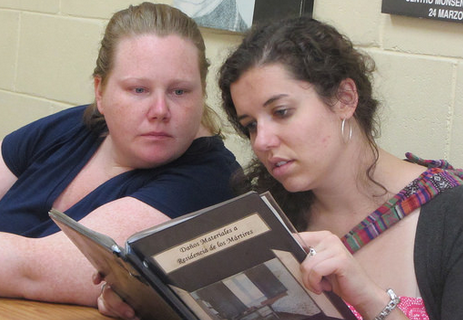
Katie Hart (right) with Amy Chapman at the Romero Center on the UCA campus during ISN’s 25th anniversary delegation to El Salvador in July 2014.
Katie Hart is a graduate of Creighton University and is currently in graduate studies at Saint Louis University. Katie participated in ISN’s 25th anniversary delegation to El Salvador in July 2014.
As a young adult Catholic, I constantly struggle to see the Church alive and at work in the dark places of our world. These are places where the lonely, the suffering, and the impoverished so desperately need to experience the love of Christ. I often feel as though the Church tells me to separate my commitment to those who suffer from my faith—holy people, especially martyrs, are those who lived long ago, prayed a lot, and rarely sinned. How do I live a holy life working in inner city St. Louis as a social worker when most of the holy people I’ve read about were shut up in convents hundreds of years ago?
The official recognition of Romero as a martyr of the Church throws this idea of holiness upside down. This announcement tells me that holiness can be achieved by ordinary people—people like Romero who lived, not too long ago, to give voice to the voiceless. Romero’s life was far from pristine. He struggled to do the right thing in speaking out against government oppression, and spent much of his later years fearing for his life. This announcement tells me that holy people are imperfect. Holy people try and fail and try again. Holy people confront injustice, even when it is difficult, and scary, and messy. The acknowledgement of Romero as a martyr by the Church validates the experiences of thousands of modern-day holy people who are working for justice every single day in the midst of our broken world. Today, I am proud to be a young Catholic. Archbishop Oscar Romero, ¡Presente!

Garrett Gundlach, S.J.
Garrett Gundlach, S.J., is a Jesuit scholastic currently studying at Loyola University Chicago. He is a graduate of Marquette University and studied at Santa Clara University’s Casa de la Solidaridad in El Salvador during his undergraduate years.
To make a statement about Romero’s death is to make a strong statement about his life. Adding “Martyr of the Church” to Archbishop Oscar Romero’s name and legacy is to deeply root his life’s work not only for the cause of “social justice” but also in the prophetic life of the Church. Recognizing Romero’s political martyrdom for his outspoken “preferential option for the poor” in El Salvador is in itself inspirational, but further recognizing his martyrdom for the Church does more than inspire—it should challenge us. Romero led the Salvadoran church the way he best knew how—going to the people, listening to them, celebrating their spirit and mourning their losses. From them he learned about injustice; from them he then mustered the courage to speak out against it. This was not merely a political act, one for the history books . . . no, this was a Christian act, one that should prompt us as fellow Christians to ask ourselves, “Where is Christ crucified among us? What am I doing for Christ crucified among us? What systems and injustices are crucifying Christ among us?” This doesn’t say anything new about Romero; the Salvadoran Church would have told you he was a “Martyr of the Church” 30 years ago; this says something new and repeating about the Church of the 20th, 21st centuries and beyond: we must not be silent as Christ is systematically crucified among us. Romero is now an official patron for this courage that we as a Church are called to.
Chris joined the Ignatian Solidarity Network (ISN) as executive director in 2011. He has over fifteen years of experience in social justice advocacy and leadership in Catholic education and ministry. Prior to ISN he served in multiple roles at John Carroll University, including coordinating international immersion experience and social justice education programming as an inaugural co-director of John Carroll’s Arrupe Scholars Program for Social Action. Prior to his time at John Carroll he served as a teacher and administrator at the elementary and secondary levels in Catholic Diocese of Cleveland. Chris speaks regularly at campuses and parishes about social justice education and advocacy, Jesuit mission, and a broad range of social justice issues. He currently serves on the board of directors for Christians for Peace in El Salvador (CRISPAZ). Chris earned a B.A. and M.A. from John Carroll University in University Heights, Ohio. He and his family reside in Shaker Heights, Ohio.

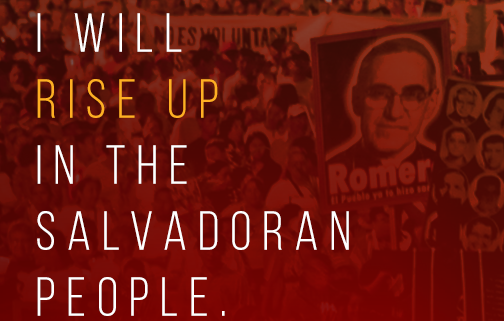
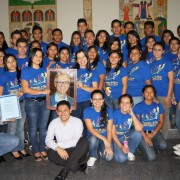
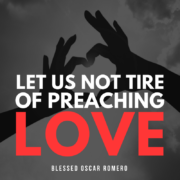

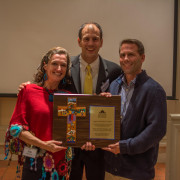
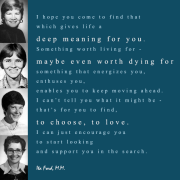
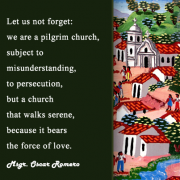



Thank you. Inspiring voices. so pleased the young get him.